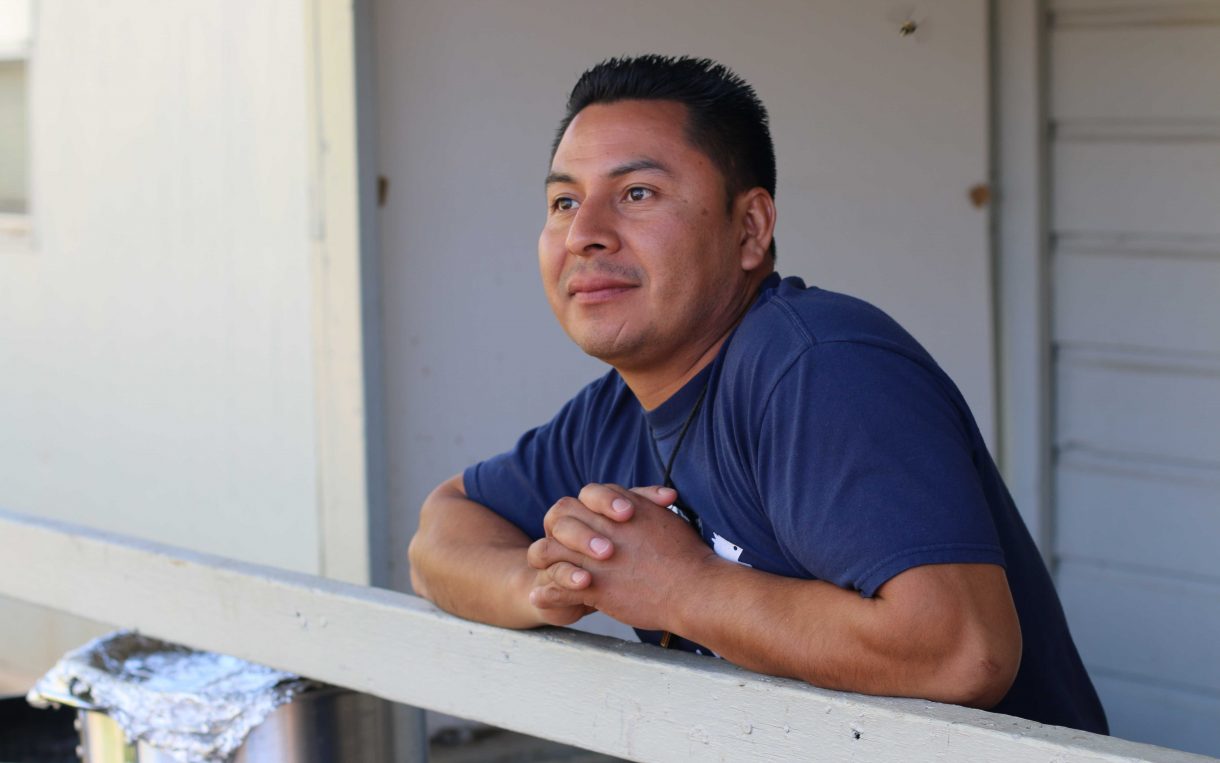These are not our enemies. They are our families.
 Originally from Guatemala, Bacilio Castro moved to Morganton, North Carolina to work in poultry processing. After several years in the plant, he went on to work with the Western North Carolina Workers’ Center, helping to inform poultry workers about their rights. Photo by Mary Babic/Oxfam America
Originally from Guatemala, Bacilio Castro moved to Morganton, North Carolina to work in poultry processing. After several years in the plant, he went on to work with the Western North Carolina Workers’ Center, helping to inform poultry workers about their rights. Photo by Mary Babic/Oxfam America
The campaign that started with a shot over the bow toward Mexico today took shape with a presidential executive order aimed squarely at the people south of the US border.
President Trump continues to paint a portrait of immigrants that is intended to terrify. So many “bad hombres” who pose a threat to our national security. Murderers, rapists, drug dealers. His dystopian vision of America features these shadowy figures stealing our jobs and holding us hostage.
His plan to deal with this involves armed force and a large border wall to lock us in and keep us safe.
There is plenty wrong with this plan, more than we can cover here. But just a bit: more Mexicans are flowing south than flowing north toward the US; the most dire immigration story today has to do with innocents (women and children) who are fleeing genuine “carnage” in their home countries in Central America (violence, poverty, drugs). (Recently, I asked a woman visiting from El Salvador if she wanted to take the subway or walk; she said, “Oh, I want to walk, of course. I love to walk. I can’t walk anywhere at home because of the gangs.”)
You have to wonder if members of this administration, and nominees for the Cabinet, have made any effort to walk a mile in their shoes. Or even a few footsteps.
Because it doesn’t take a lot of effort to meet immigrants, and to see the reality of their lives. Today, a friendly, ruddy woman from Brazil poured my coffee at Dunkin’ Donuts. Tonight, the man from Mexico who cleans our offices will arrive for work at 5pm, and spend the night emptying trash and vacuuming. When I stop at Trader Joe’s on the way home, the young man from Somalia will be stocking shelves and sweeping up.
These are today’s immigrants, just like my grandparents were immigrants, from Yugoslavia and Italy. Almost every one of them is tied to a web of family, here and in their home country, laboring long hours to send money home, to pay rent and buy groceries for their families. They earn low wages, and struggle to build a better life for their children. They take the bus early in the morning and late at night, weary and determined.
In my work at Oxfam, I’ve met workers from many countries, such as Mexico, Guatemala, Argentina, the Marshall Islands, Laos. Here’s the thing: they’re just like us. Some are quick and funny and warm, offering bowls of soup in noisy houses full of kids and dogs. Some are guarded and curious, nervous and shy. Some are proud of their work and articulate, eager to get ahead, ready to detail their accomplishments and show their diplomas. Some are just exhausted.
Stories pour out
Everyone has a story to tell. And usually, when you ask, it pours out. They’re so happy to have a voice, and someone willing to listen. And they are classic immigrant stories: leaving places where poverty strangles opportunity and starves children, to come to the US and find jobs and work, long and hard; to send money home, while living in dim, cramped trailers and apartments.
What’s more, they do the hard, often invisible, work that keeps the economy humming: food prep, construction, cleaning, agricultural work. They trim wings off chickens in cold factories, stoop to pick strawberries in the blazing sun, sand and seal wood floors in houses, shuck oysters and scallops in wet processing barns.
These are jobs that are arduous, exhausting, dangerous, and don’t pay well. The truth is that these jobs often go unfilled, unless immigrants step up to do them. If we lose these workers – to deportation or emigration or attrition – these jobs may go unfilled for a long time.
And then who wins?
So yes, we can build a wall and guard the wall and keep people out. But it will cost us. In labor, in money, and in the giant great spirit of welcome and refuge that built our country.
One of my grandfathers was a blacksmith; the other was a fruit vendor. They were both burly, muscled men with white mustaches and broad shoulders and huge spirits. I see them every day, in the man who empties the trash and the man who makes the egg sandwich.
These are not our enemies. These are our families.